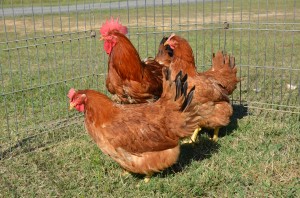The information below comes from the National Chicken Council’s website. As you are probably aware, chicken is one of the best sources for lean protein around. Read below to see why!
WASHINGTON, D.C. – January 14, 2014 – According to health professionals and nutritionists, protein is the cornerstone of a healthy and balanced diet. Chicken is one of the best sources of what nutritionists call “high-quality” protein. The body uses it to create new cells, repair existing ones and produce the enzymes necessary to boost metabolism and promote healthy digestion.
To read more about the importance of protein in your diet, see this article by the National Chicken Council.
There are a number of benefits to gain, simply by incorporating chicken into your diet. Read on to learn more and eat your way to a healthier 2014!
1. Only 4 grams of total fat in a skinless chicken breast serving—only 6 percent of the daily recommended intake.
2. 5 to 7 ounces of protein should be eaten by Americans on a daily basis, according to the U.S. Dietary Guidelines. A 3.5 ounce serving of chicken has half the daily recommendation of protein. Chicken is a high quality protein because it contains all of the essential amino acids and has a great nutrient per calorie ratio. The American Heart Association also promotes chicken as one of the best ways to keep cholesterol levels down naturally.
3. Only 9 grams of fat in a 3.5 ounce serving of dark meat. Though dark meat is slightly higher in fat than white meat, it’s still lower than most cuts of red meat and a great (and flavorful) source of iron and other nutrients. Don’t fear the legs and thighs!
4. 2014 Dietary Trends all incorporate chicken, including Paleo, DASH, MyPlate, Weight Watchers and the Dukan Diet, famously employed by Kate Middleton in the months leading up to the Royal Wedding.
5. Affordable – Chicken is not only the best protein option for your waistline, it’s the best option for your wallet. You can even take the money you save on chicken and put it towards a gym membership!
6. Natural – There are no artificial or added hormones used in the production of any U.S. chicken. In fact, the use of such hormones is expressly forbidden by the U.S. Food & Drug Administration (FDA). Labels that read: “Raised without hormones” are redundant and must also include a statement saying that no hormones are used in the production of any poultry raised in the United States.
7. Nutrient-Rich – Chicken is a great source of iron and zinc, as well as Vitamins B3, B6, B7 and B12, helping boost metabolism and the immune system, while also lowering cholesterol and promoting normal function of the brain and nervous system.
8. Weight Loss – Chicken can help you lose weight because protein helps regulate appetite and cravings by making you feel fuller longer. Our protein needs are determined by lean body mass, not calories, so as calories are decreased on a weight loss plan, protein intake should stay the same, or even increase if you want to preserve muscle.
9. Versatile – Chicken is the little black dress of protein—it’s always in style and goes with everything. Use it for “planned-overs,” not leftovers. Use grilled or baked chicken throughout the week to make simple, healthy dinners, served over a salad of mixed greens, or mixed with peppers and onions for fajitas.
10. Winter blues getting to you? Chicken is high in an amino acid called tryptophan. If you’re feeling seasonal depression kick in eating chicken will increase the serotonin levels in your brain, which will help to improve your mood and kick stress to the curb.
“Chicken is my go-to food for nutrition, taste and easy prep,” says Sheah Rarback, a registered dietician, nutrition columnist for the Miami Herald and faculty member of the Miller School of Medicine at the University of Miami. “It is multi-cultural and tastes terrific in Italian, Spanish, Asian and Middle Eastern cuisine as well as the classic American chicken salad. A neat 4 ounce portion is less than 200 calories and provides 36 muscle-building grams of protein.”
For chicken recipes, visit www.chickeneverymonth.com and www.eatchicken.com.

